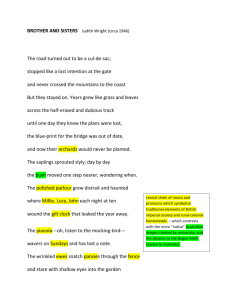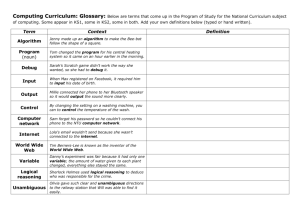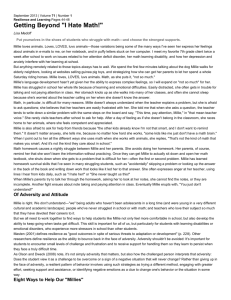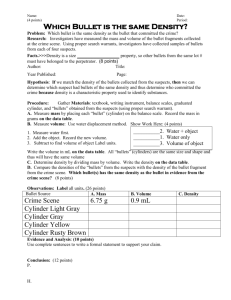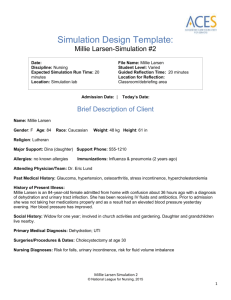How do you handle after-death choices? (Organ/tissue donations
advertisement
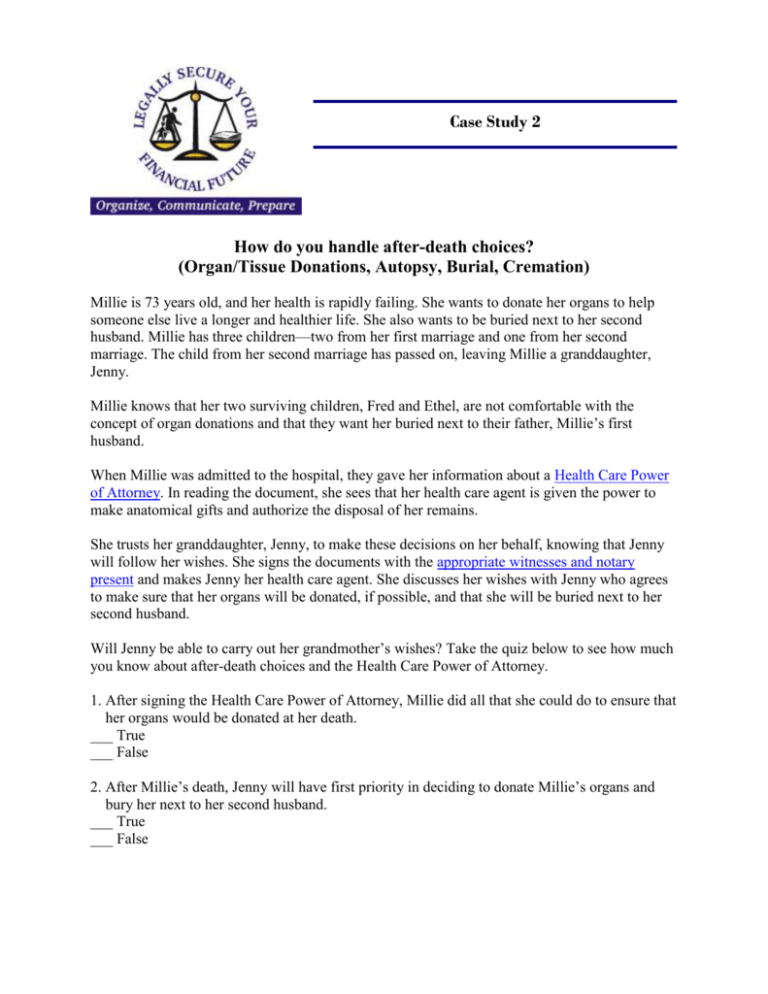
Case Study 2 How do you handle after-death choices? (Organ/Tissue Donations, Autopsy, Burial, Cremation) Millie is 73 years old, and her health is rapidly failing. She wants to donate her organs to help someone else live a longer and healthier life. She also wants to be buried next to her second husband. Millie has three children—two from her first marriage and one from her second marriage. The child from her second marriage has passed on, leaving Millie a granddaughter, Jenny. Millie knows that her two surviving children, Fred and Ethel, are not comfortable with the concept of organ donations and that they want her buried next to their father, Millie’s first husband. When Millie was admitted to the hospital, they gave her information about a Health Care Power of Attorney. In reading the document, she sees that her health care agent is given the power to make anatomical gifts and authorize the disposal of her remains. She trusts her granddaughter, Jenny, to make these decisions on her behalf, knowing that Jenny will follow her wishes. She signs the documents with the appropriate witnesses and notary present and makes Jenny her health care agent. She discusses her wishes with Jenny who agrees to make sure that her organs will be donated, if possible, and that she will be buried next to her second husband. Will Jenny be able to carry out her grandmother’s wishes? Take the quiz below to see how much you know about after-death choices and the Health Care Power of Attorney. 1. After signing the Health Care Power of Attorney, Millie did all that she could do to ensure that her organs would be donated at her death. ___ True ___ False 2. After Millie’s death, Jenny will have first priority in deciding to donate Millie’s organs and bury her next to her second husband. ___ True ___ False Case Study 2 3. After Millie’s death, her children, Fred and Ethel, will have the right to determine whether her organs are donated and where she is buried. ___ True ___ False 4. Whoever makes these decisions on Millie’s behalf is legally bound to follow her oral wishes. ___ True ___ False 5. It depends upon whether Millie had said “yes” to organ donation on her driver’s license. ___ True ___ False 6. If Millie were competent up to the time that she died, Jenny would not have had the authority to donate Millie’s organs or arrange for her burial. ___ True ___ False Adapted for use in the Legally Secure Your Financial Future program; prepared by Carol A. Schwab, J.D., LL.M., former professor and Extension Specialist, NC State University. Reviewed for Idaho use by Boise attorney, Robert Aldridge, 9/04 Copyright This document is for non-profit educational purposes only. This document may not be used by a profit-making company or organization. When used by a non-profit organization, appropriate credit must be given to the Cooperative Extension Legally Secure Your Financial Future: Organize, Communicate, Prepare education program. Materials for this program were developed by a team from six land-grant universities. The program is included in the program toolkit of the Cooperative Extension Financial Security in Later Life national initiative. For more information go to: http://www.csrees.usda.gov/fsll. Legally Secure Your Financial Future: Organize, Communicate, Prepare Cooperative Extension 2 Case Study 2 Case Study 2 Answers How do you handle after-death choices? (Organ/Tissue Donations, Autopsy, Burial, Cremation) The following answers are based upon Idaho law as of September, 2004. The laws in other states may be different. Laws are subject to change, so please ask your attorney for answers to specific questions. 1. After signing the Health Care Power of Attorney, Millie did all she could do to ensure that her organs would be donated at her death. Idaho answer: False Millie could have also executed a Uniform Bodily Parts Donation Act Agreement. 2. After Millie’s death, Jenny will have first priority in deciding to donate Millie’s organs and bury her next to her second husband. Idaho answer: True Under Idaho law, the health care powers continue in existence for the donation. Burial, however, is under a different statute. If Millie executed a funeral burial document conforming to the statute, her wishes are more likely to be followed. 3. After Millie’s death, her children, Fred and Ethel, will have the right to determine whether her organs are donated and where she is buried. Idaho answer: False However, This depends on what documents Millie had executed. 4. Whoever makes these decisions on Millie’s behalf is legally bound to follow her oral wishes. Idaho answer: False as to burial; True as to organ donations under the Health Care Power of Attorney. 5. It depends upon whether Millie had said “yes” to organ donation on her driver’s license. Idaho answer: True 6. If Millie were competent up to the time that she died, Jenny, her granddaughter, would not have had the authority to donate Millie’s organs or arrange for her burial. Idaho answer: False for organ donation; True for Millie’s burial. Adapted for use in the Legally Secure Your Financial Future program; original prepared by Carol A. Schwab, J.D., LL.M., former professor and Extension Specialist, NC State University. Adapted for Idaho use by Boise Attorney, Robert Aldridge, September 2004. This publication is provided as a public service and is designed to acquaint you with certain legal issues and concerns. It is based upon the laws of Idaho. It is not designed as a substitute for legal advice, nor does it tell you everything you may need to know about this subject. Future changes in the law cannot be predicted, and statements in this publication are based solely on the laws in force on the date of publication. Copyright Date: September 2004 Legally Secure Your Financial Future: Organize, Communicate, Prepare Cooperative Extension 3 Case Study 2 This document is for non-profit educational purposes only. This document may not be used by a profit-making company or organization. When used by a non-profit organization, appropriate credit must be given to the Cooperative Extension Legally Secure Your Financial Future: Organize, Communicate, Prepare education program. Materials for this program were developed by a team from six land-grant universities. The program is included in the program toolkit of the Cooperative Extension Financial Security in Later Life national initiative. For more information go to: http://www.csrees.usda.gov/fsll. Legally Secure Your Financial Future: Organize, Communicate, Prepare Cooperative Extension 4


